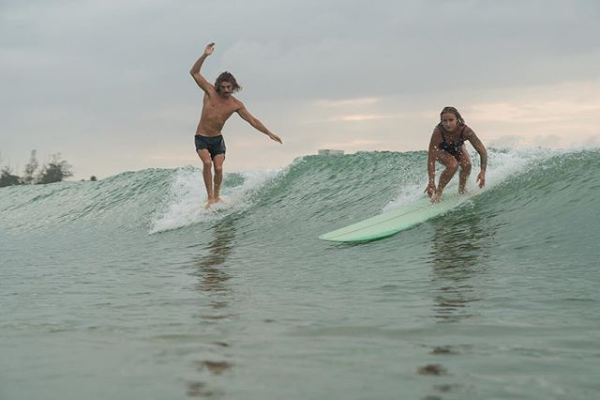“Have our own voice”: Hello Zukeen on taking risks, celebrating the arts and the joy of magazines

Dunedin-based indie arts and culture magazine Hello Zukeen documents creativity and captures a vibrant New Zealand youth culture, with three issues released so far.
The eclectic exploration includes surfing trips, profiles of up-and-coming bands, poetry and skateboarding. Issue one’s editorial boldly proclaims:
“This magazine is a break for jaded eyes. A rest from incessant scrolling. Something to hold, to caress, something to deface. It’s honest, unpretentious and unafraid to take risks.”
The motivation to start Hello Zukeen came from its three creators – designer Will Meehan, editor Sam Fraser-Baxter and photographer Cam Hay – wanting to get their own stuff out there.
“It felt like we were part of a really fruitful arts scene in Dunedin, particularly music,” Fraser-Baxter says. “We just wanted to capture that, put it in something solid and have it as a really nice time capsule.”
Having an outlet meant the trio could be as productive as they wanted.
“We could make it our own thing, have our own voice. It’s been really nice because we can publish and write whatever we want,” he says.

Fraser-Baxter’s foray into writing came as he was studying for a master’s of science communication. “I was super green and super keen,” he admits.
In 2015 Fraser-Baxter met Hay, a geography student with a passion for photography, at a party where they bonded over surfing. At the time, Hay was getting into surf photography and Fraser-Baxter was writing for a surf magazine.
Fraser-Baxter saw Hay’s photos and thought the two of them should start a surfing and music website but it didn’t happen “because we were students,” Fraser-Baxter says.
At the start of 2016 the duo met graphic design student Meehan who was really keen on print and Hello Zukeen was born.
The title of the magazine has no meaning behind it, a bit of gibberish Fraser-Baxter explains, that evolved from a couple of mates chatting.

Is print dead?
StopPress puts the notion that supposedly print is dead to Fraser-Baxter and asks if Hello Zukeen was trying to buck a trend?
“I think we were just really naïve,” he laughs.
“I think if we knew exactly what we were in for we probably wouldn’t have followed through.”
What the trio liked about print is that there are different ways people are going to relate to, and experience, the content.
“If you sit down with a magazine or a book you know you’re going to put away 10 to 15 minutes or an hour of your time,” Fraser-Baxter says.
He elaborates by explaining that because people have those different expectations one can write longer stories.
“It doesn’t have to be as snappy or punchy as online content where you’ve got thousands and thousands of stories and photos competing for your attention – similar to vinyl, you’re not going to put on a record and skip tracks.”

Challenges and opportunities
Self-publishing has been a tough slog at times, especially as the three have been making Hello Zukeen while either studying or working.
“But we never thought about it as a money maker, we’re doing it for fun, for art’s sake,” Fraser-Baxter says.
In terms of funding, he says initially the group took pre-orders and paid their Dunedin-based printers after, with 250 copies in a print run.
“For the last issue we almost covered the cost of printing by selling advertising – that was a nice breakthrough because with the actual sales of the magazine the margins are super slim because the cost of printing small runs is really high.”
The magazine is sold exclusively online because the margins are too fine to be able to sell it in retail. Kiwi coffee roaster Allpress, Auckland-based surf brand Velvet Grip Co and power company Electric Kiwi all advertised in the third issue alongside Corona, who Fraser-Baxter says, has been advertising in Hello Zukeen from the start.
In terms of the magazine’s content, the three do a lot themselves but have accepted several pitches from people. While Hello Zukeen was started and based in Dunedin the reach has moved up the country “through like-minded grapevines,” Fraser-Baxter says.
But it hasn’t been all plain sailing. He says following the publication of the first issue they received criticism there wasn’t enough female talent in it.
“At the time we didn’t have female representation/contributors in mind, we were just really blasé about the content, we were just improvising. We took that feedback on board and have been increasing the female representation each issue.”
He says with the third issue the representation is close to 50/50 in terms of artist profiles and contributors.

Looking back, Fraser-Baxter says with the first issue the team made every mistake that they could “which was fantastic because with every mistake there is something to learn from.”
“In terms of print we learnt about the brutal reality of the industry and why it’s a dying thing, but if we weren’t so naïve we wouldn’t have followed through. Aside from that we’ve met so many talented people and managed to create something we’re proud of and we can hold on to and hopefully other people do too.”
While the magazine has been Dunedin-based until now, all three have recently left the city. Fraser-Baxter has just spent time travelling in Mexico and Central America while Meehan and Hay will be relocating around the country and in Australia.
“Every magazine we finish, then we’ve got to market and sell and dispatch and post and then once that’s over you’re so tired and sometimes wonder why we do this – but we will definitely be doing a fourth issue but it won’t be for some time.”





